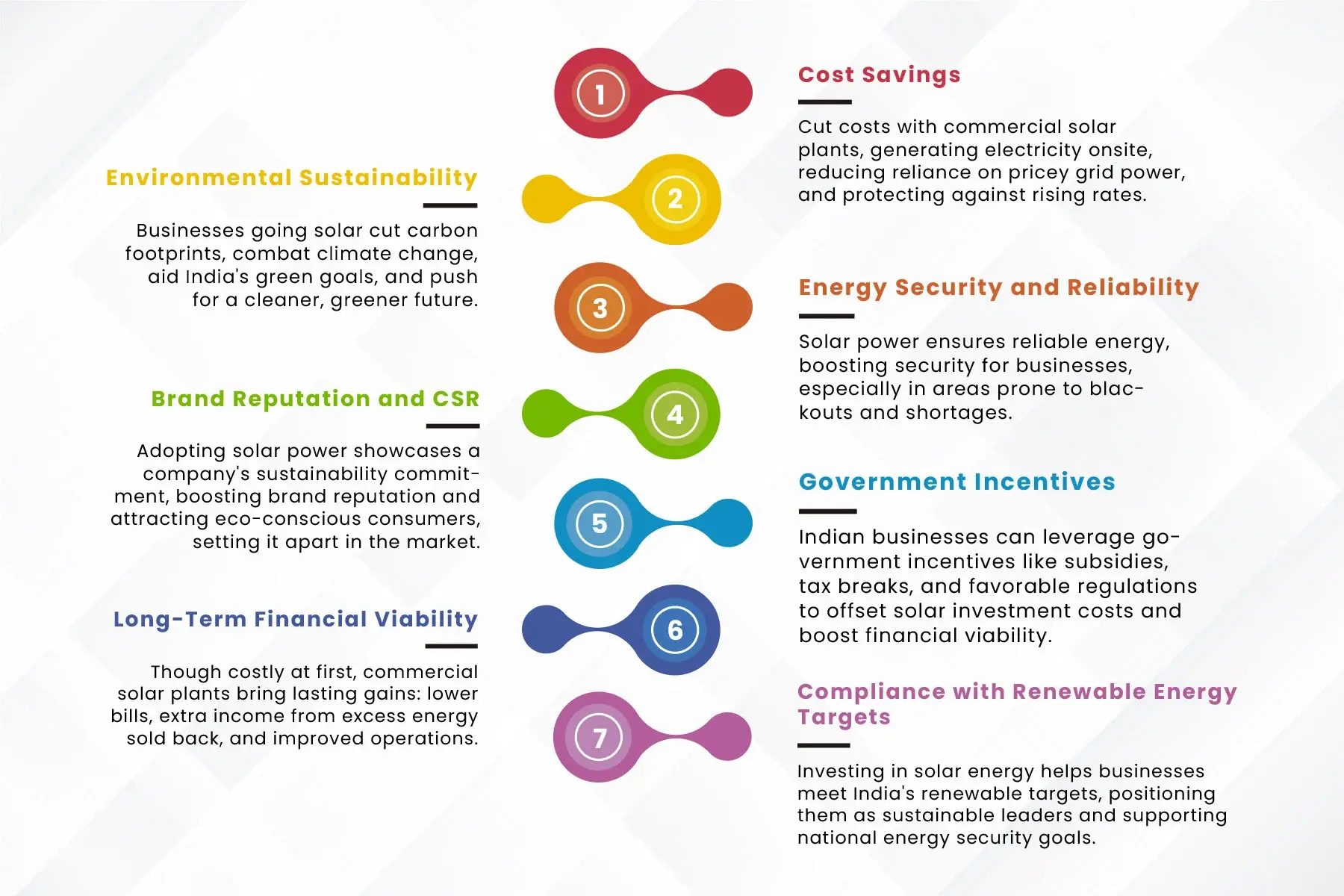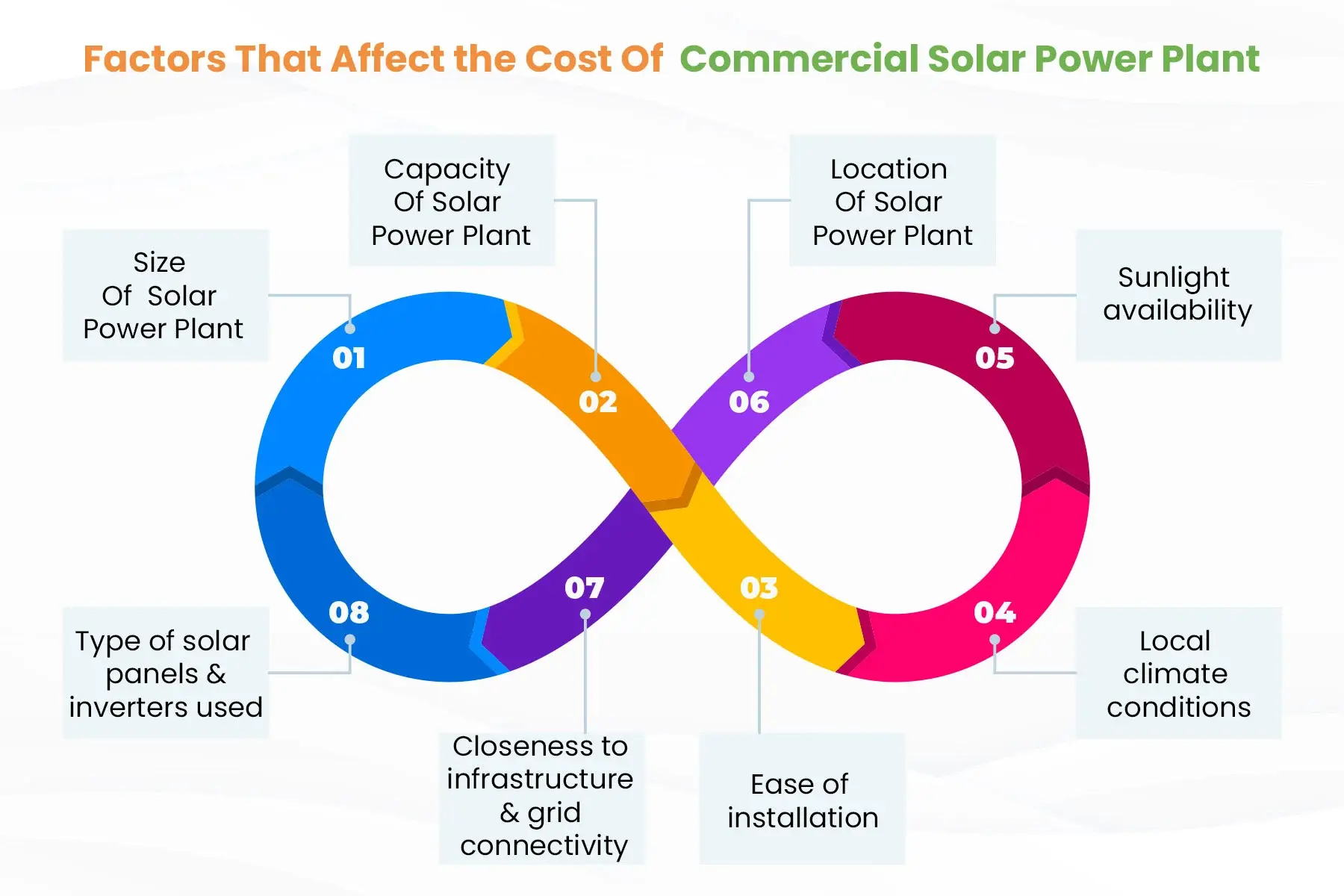In recent years, there has been a noticeable shift towards sustainable energy solutions, driven by both environmental concerns and economic incentives.
One of the most promising avenues in this regard is the adoption of commercial solar power plants.
This blog aims to provide a comprehensive overview of commercial solar power plants, focusing particularly on the Indian context.
We’ll delve into their definition, benefits, subsidies available, costs involved, and the burgeoning market for commercial solar in India.
What is Commercial Solar Power Plants
Solar in India is now widely used and is also utilized in commercial premises to ensure the electricity bill does not go out of the roof.
Commercial solar plants are like powerful energy factories that connect directly to the grid, ensuring a steady flow of electricity. Made up of solar panels, inverters, and other essential parts, they’re also called on-grid solar systems.
These systems are designed to meet the energy demands of commercial and industrial establishments, such as offices, factories, warehouses, shopping malls, and educational institutions.
Unlike residential solar setups, which cater to individual households, commercial solar power plants are tailored to supply electricity to larger facilities with higher energy consumption requirements.
Key components of Solar Power Plants include:-
- Photovoltaic (PV) panels
- Inverters
- Mounting structures
- Monitoring systems
Benefits of a Commercial Solar Plant

- Cost Savings: Commercial solar power plants offer businesses significant cost savings on electricity bills by generating their electricity onsite, reducing reliance on expensive grid power and hedging against rising electricity prices.
- Environmental Sustainability: By transitioning to solar energy, businesses can reduce their carbon footprint and mitigate climate change impacts, contributing to India’s environmental sustainability goals and promoting a cleaner, greener future.
- Energy Security and Reliability: Solar energy provides a reliable and uninterrupted source of power, enhancing energy security and reliability for businesses, particularly in regions prone to grid outages and power shortages.
- Brand Reputation and CSR: Embracing solar energy demonstrates a company’s commitment to sustainability, enhancing brand reputation and corporate social responsibility efforts. This can attract environmentally conscious consumers and differentiate the business in the marketplace.
- Government Incentives: Businesses can benefit from various government incentives and subsidies available in India, including subsidies, tax incentives, and favorable regulatory frameworks. These incentives help offset the initial investment and improve the financial viability of solar energy adoption.
- Long-Term Financial Viability: Despite the initial investment, commercial solar power plants offer long-term financial benefits, including reduced electricity bills, potential revenue from excess energy generation through net metering, and enhanced operational efficiency.
- Compliance with Renewable Energy Targets: Investing in solar energy helps businesses comply with India’s renewable energy targets and regulatory requirements, positioning them as leaders in the sustainable energy transition and contributing to national energy security goals.
Navigating Subsidies for Commercial Solar Projects
Government incentives and subsidies play a crucial role in making solar energy more accessible to businesses.
In India, various schemes and initiatives are available at both the central and state levels to promote solar adoption.
These subsidies can significantly offset the initial investment and shorten the payback period for commercial solar projects.
By leveraging available incentives effectively, companies can optimize their return on investment and accelerate the transition to solar energy.
Unlock the full potential of your solar investments with expert guidance from Novergy.
Our team provides invaluable advice on navigating subsidy programs, empowering businesses to make informed decisions and maximize their financial benefits.
Let Novergy be your trusted partner in harnessing the sun’s energy for sustainable growth.”
To know more about the govt schemes, one can visit the official website and check out the latest and ongoing Govt. schemes under solar energy.
Commercial Solar Power Plants: A Boon for Indian Industries
India’s vast potential for solar energy makes it an ideal market for commercial solar power plants. The country’s ambitious renewable energy targets and favorable regulatory environment have spurred rapid growth in the solar sector.
From manufacturing units to IT parks and educational institutions, businesses across various industries are embracing solar power to meet their energy needs sustainably.
These examples showcase the diverse applications of solar energy and the tangible benefits experienced by companies in terms of cost savings, energy independence, and environmental stewardship.
As the demand for clean energy continues to rise, commercial solar power plants are poised to play a pivotal role in driving India’s industrial growth.
Breaking Down the Investment in Commercial Solar

Calculating the costs associated with investing in commercial solar power plants in India is a crucial step for businesses in India considering renewable energy solutions.
Several factors influence the overall investment, and understanding these intricacies can help businesses make informed decisions.
One significant factor is the size and capacity of the solar power plant required to meet the energy needs of the commercial establishment.
The larger the system, the higher the initial investment.
However, it’s essential to strike a balance between system size and energy requirements to optimize cost-effectiveness.
Working with experienced solar consultants like Novergy can help businesses accurately assess their energy needs and determine the most suitable system size.
Location also plays a vital role in determining the cost of a commercial solar project.
Factors such as sunlight availability, local climate conditions, and the ease of installation can impact overall costs.
In India, regions with abundant sunlight and favorable climatic conditions are more conducive to solar energy generation, potentially reducing installation costs.
Additionally, Closeness to existing infrastructure and grid connectivity can influence project logistics and associated expenses.
Another important factor is technology choices, such as the type of solar panels and inverters used, also affect project costs.
While there are various solar panel technologies available, each with its advantages and cost considerations, selecting the most appropriate technology is critical for maximizing energy generation and optimizing return on investment.
Similarly, choosing high-quality inverters and other system components may entail higher initial costs but can result in greater reliability and long-term savings.
Let’s light up your energy future together! Explore Novergy’s premium inverters today!
Conclusion
To conclude, commercial solar power plants offer a compelling solution for businesses seeking sustainable energy alternatives in India.
From reducing operational expenses to enhancing corporate social responsibility initiatives, the benefits of solar energy are multifaceted.
With government subsidies, favorable regulatory policies, and technological advancements driving the solar revolution, there has never been a better time for businesses to invest in solar power.
As the demand for clean energy continues to grow, businesses must seize the opportunity to harness the power of the sun for sustainable growth and long-term prosperity.
By understanding the nuances of commercial solar projects, navigating subsidy programs effectively, and managing costs prudently, businesses can position themselves as leaders in the transition to a clean energy future.
Let’s power the path to a brighter tomorrow with commercial solar power plants. Have questions or ideas? We’re all ears! Get in touch today!

